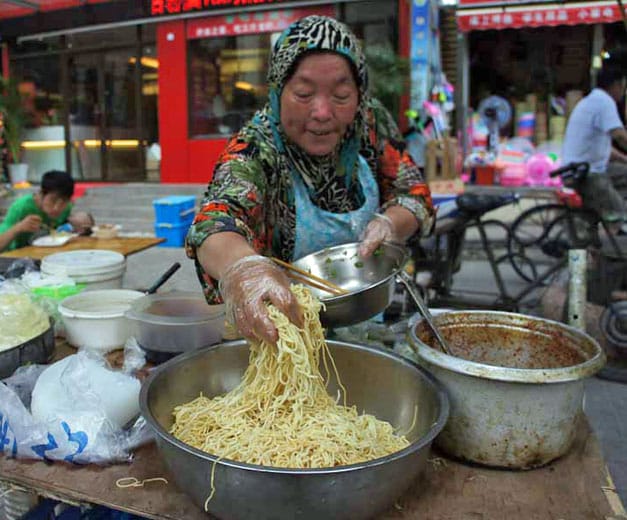One of China’s most successful franchise stories comes from Putian, a coastal city in Fujian with a population of about 3 million. The province is probably known best for the many who leave it, especially those who have been smuggled into the United States by snakeheads, and including domestic emigrants who move to hub cities, bringing their culinary traditions along with them.
After the boom of the post-Reform and Opening period, Putian residents started spreading their culinary diaspora via “thousand mile fragrant” wontons (千里香馄饨, qiānlǐxiāng húntun), a dish made famous after Premier Zhou Enlai praised it decades before. By the 1990s, shops selling these wontons had popped up all over the country outside of schools, targeting young diners for their after-school snack. In Shanghai alone, there are almost 380 shops selling them (KFC, for comparison, has just 360 shops in the city). Owners attribute the success of the dumpling franchise to its universal appeal – although it’s a Fujian specialty, its allure crosses provincial boundaries – and its reputation of reliability no matter where you go in the country draws diners in.
While the wontons are hand-wrapped at each stall, the nuts and bolts of the bite-sized dumplings are generally sent in from a centralized processing plant to guarantee consistency. The key to the perfect wontons is fourfold: toasted sesame oil, tasty soup, good pork and special wonton skins.
 The incredibly thin wrappers, made from wheat and glutinous rice flour, are almost translucent, often flatteringly referred to in Chinese as “crystal,” with a mouthfeel that can only be described as slippery smooth. The soup is boiled for hours with chicken and pork bones, spices (like star anise), seaweed and shrimp shells to extract the essence of the ingredients, then the wontons are hand-stuffed with fresh minced pork leg (ideally from an animal that has been slaughtered on the same day) and lard, then dropped into the soup for a quick boil that allows the savory broth to soak through and flavor the pork filling. A pinch of green onions is thrown in at the end to add a burst of freshness.
The incredibly thin wrappers, made from wheat and glutinous rice flour, are almost translucent, often flatteringly referred to in Chinese as “crystal,” with a mouthfeel that can only be described as slippery smooth. The soup is boiled for hours with chicken and pork bones, spices (like star anise), seaweed and shrimp shells to extract the essence of the ingredients, then the wontons are hand-stuffed with fresh minced pork leg (ideally from an animal that has been slaughtered on the same day) and lard, then dropped into the soup for a quick boil that allows the savory broth to soak through and flavor the pork filling. A pinch of green onions is thrown in at the end to add a burst of freshness.
Just as popular for takeaway (带走, dàizǒu) as it is for dining in, each location also sells the wontons for cooking at home. Still handmade to order, the pork parcels are served dry in a doggy bag, along with two separate containers: one with the fresh herbs and the other with the broth. All you need is a bubbling wok.
 June 8, 2019 Food Court Deluxe
June 8, 2019 Food Court Deluxe
Mall dining in Asia is nothing like its American counterpart, thanks mostly to the humid […] Posted in Shanghai January 25, 2016 Top Buns
January 25, 2016 Top Buns
Bāozi (包子), or steamed buns, are a basic, on-the-go meal. It’s rare to come across a […] Posted in Shanghai December 16, 2013 Best Bites 2013
December 16, 2013 Best Bites 2013
Editor’s note: This post is the first installment of “Best Bites of 2013,” a roundup of […] Posted in Shanghai
Published on June 09, 2014
Related stories
June 8, 2019
ShanghaiMall dining in Asia is nothing like its American counterpart, thanks mostly to the humid climates of Singapore and Hong Kong. These two islands have tunnels and bridges connecting malls throughout the cities, making them easy to traverse while staying inside the air-conditioned environment. When temperatures spike – as they do on most days –…
January 25, 2016
ShanghaiBāozi (包子), or steamed buns, are a basic, on-the-go meal. It’s rare to come across a shop selling these buns for more than 1.5 RMB (US$0.25), and yet, the past five years have seen a dramatic rise in the stature of this humble dish – thanks mostly to celebrity chef David Chang, whose Momofuku pork…
December 16, 2013
ShanghaiEditor’s note: This post is the first installment of “Best Bites of 2013,” a roundup of our top culinary experiences over the last year. Stay tuned for “Best Bites” from all of the cities Culinary Backstreets covers. Deng Ji Chuan Cai Culinary bucket lists are some of the best ways to discover our friends’ hidden…

















































































